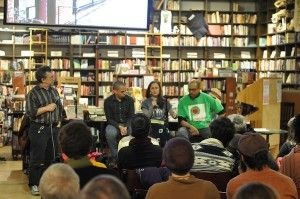
On Thursday, February 12, more than 125 people came out to Red Emma’s Bookstore and Café for a screening and discussion of the new documentary film Food Chain$. The event, co-sponsored by The Baltimore Food & Faith Project and The Marc Steiner Show, revealed how the historical injustices of farm labor persist even today in our food supply chain, and how large produce buyers like fast food and supermarkets are complicit in this egregious system.
The film chronicles how the Coalition of Immokalee Workers (CIW), a tomato farmworker organization headquartered in Immokalee, Florida, has achieved significant steps toward a more just food system through its innovative Fair Food Program. Recognized in The New York Times as the “best workplace-monitoring program in the U.S.,” this program increases wages for workers by 20-35 percent per week (NY Times) through a penny-per-pound premium, mandates strict standards for rest breaks, and forbids sexual harassment and verbal abuse.
 In addition to covering the CIW’s most recent campaign against the supermarket chain Publix, the film touched on how the entire history of agriculture in our country has been rooted in exploitation. Beginning with slavery and sharecropping and continuing with the current system based on the labor of low-wage immigrant workers, the system exploits whichever group rests at the bottom of the power chain at that moment. These farm labor injustices extend far beyond the tomato fields that the CIW organizes around to those providing essentially every bite of food on our plates (or wine in our glasses).
In addition to covering the CIW’s most recent campaign against the supermarket chain Publix, the film touched on how the entire history of agriculture in our country has been rooted in exploitation. Beginning with slavery and sharecropping and continuing with the current system based on the labor of low-wage immigrant workers, the system exploits whichever group rests at the bottom of the power chain at that moment. These farm labor injustices extend far beyond the tomato fields that the CIW organizes around to those providing essentially every bite of food on our plates (or wine in our glasses).
Following the film, Marc Steiner facilitated a panel discussion (listen here) with Sergio España (served on steering committee for Student Farmworker Alliance from 2008-2013), Rachel Winograd (Food Justice Coordinator for CATA; see below for more info), and the spoken word artist Analysis (poet, activist, minister, organizer, consultant, and educator).
Analysis launched the discussion with his riveting poem for the CIW, which he wrote and performed for the Farmworkers Freedom March in 2010.
The panelists then talked about the need for raising consumer awareness and action. Some key quotes from the discussion:
- “It’s disturbing that food is treated without value, as if it’s not the very thing keeping us alive.”
- “We take it for granted that the millions of people in our country who are feeding us cannot even make enough to eat themselves. It’s not just shameful but there’s no need for it.”
- “When faith bodies lend their weight to something like this and challenge their own supermarket owners, it adds a certain weight… The workers are challenging us, no matter what faith we’re from, to put our calls for justice into action.”
- “It’s not just a labor or economic struggle, it’s a moral struggle… The farmworkers are saying, ‘We are humans, too. We have souls.’ In labor organizing, we tend to use the same language as our oppressors… but faith allows us to talk about each other as moral beings, people who could be diminished or robbed of their humanity.”
- “We must not forget that the cheaper the labor, the cheaper the food. So part of it comes down to us. As consumers, we have to be willing to pay more for our food.”
The panelists also offered some ways for people to get involved to support better conditions.
They encouraged attendees to visit the Fair Food Program’s website to learn more about specific actions to take. One of the easiest things we can do to put pressure on supermarkets is to present letters and ask questions to the managers at grocery stores you shop at – Safeway, Giant, and Stop & Shop are some of the local supermarkets that have not signed on to support the Fair Food Program yet.
For those looking to engage in food and farmworker justice in this area, CATA (El Comité de Apoyo a los Trabajadores Agrícolas – Farmworker Support Committee) is a non-profit, migrant farmworker organization that mostly organizes in Southern New Jersey, Eastern Pennsylvania, and the Delmarva Peninsula in Maryland. To learn more about and support CATA, visit its Facebook page, website and the Agricultural Justice Project.
Other organizations to check out include the Food Chain Workers Alliance and the Farm Labor Organizing Committee.
To close, we should take some of Analysis’ words to heart: “Most of us have never thought about the labor issues involved in the fields growing pretty much every crop… Now, none of us have the excuse of saying ‘we just don’t know.’”



